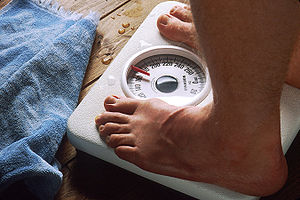[caption id="" align="alignright" width="204" caption="Image via Wikipedia"]
 [/caption]
[/caption]For example, an obese gentleman starting out at about 285 pounds lost 14 pounds, a mere 4.8% of his body weight, and lowered his hemoglobin A1c (which measures average blood sugar levels) from 10.1% to 7.8%, a full 22.77%! That brought him to within striking distance of a normal blood sugar level. Granted, he has much more weight to shed, but a tiny 14-pound weight loss on a hefty body is quite significant.
Countless studies have been done about the beneficial effects of a low-calorie diet. Granted that a low-calorie diet may not be appealing to the majority of folks. Nevertheless, it is instructive to note that in a recent study of diabetics, an 8-week course of a 600-calorie diet managed to reverse their disease!
Another tiny adjustment with huge implications: Did you know that 150 calories a day amount to almost 16 pounds a year? (150 x 365/3500=15.64). What do 150 calories represent? A can of sugar soda; or 3 small cookies; or half glass of regular beer; or 1 pat of butter/dressing. You get the point: It's a minute amount.
What this means is that by "saving" 150 calories a day, either by virtue of omitting certain foods or increasing exercise, you either save yourself from gaining about 16 pounds in a year, or you lose 16 pounds in a year. The year will pass one way or another: Your health may well improve or deteriorate based on your decisions. And the decision to do without a mere 150 calories a day should be a simple one.
No comments:
Post a Comment